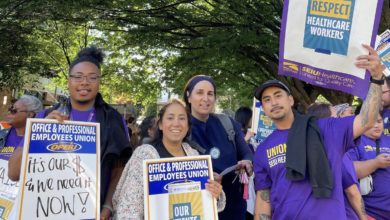Infant death rates have skyrocketed in the South in recent years. This terrible result can be traced to cuts in welfare and Medicaid, by poor access to doctors and other social problems.
An April 22 New York Times article detailed the disturbing trend. In Mississippi, the most affected state, the infant
 |
The rate was even higher among African Americans. In Mississippi, infant deaths among Black people rose from 14.2 to 17 deaths per thousand births in 2005. The rate among whites rose to 6.6 from 6.1 per 1,000.
African Americans make up roughly 37 percent of Mississippi’s population, and around 13 percent of the country’s. High percentages of African Americans live in all the Southern states.
Institutionalized racism and unequal access to health care and other social programs is part of the larger picture. On average, Black workers earn less and suffer higher unemployment than white workers.
This is the legacy of 400 years of brutal slavery and, later, Jim Crow apartheid. Although official segregation is gone, national oppression is built into the capitalist system, as reflected by nearly every social indicator.
So-called right-to-work laws in all the states of the former Confederacy have severely weakened the union movement in the South. As a result, wage levels are lower in the South than anywhere else. This impacts all workers, but it has made the climb out of poverty especially difficult for Black communities throughout the South. The smaller, but still significant increases in infant mortality Alabama, North and South Carolina, Tennessee and Louisiana confirm this trend.
The national average in the United States in 6.9 deaths for every 1,000 live births. Infant death rates among not only African Americans, but also Native American and Latinos are significantly higher.
The immediate causes of infant death in working-class Southern regions are premature and low-weight births; Sudden Infant Death Syndrome; congenital defects; and deaths from accidents and disease.
While these reasons are immediate, what’s the underlying basis for the sudden rise of infant deaths in the South? Growing poverty, massive cuts in social programs and national oppression—all basic features of capitalism.
Cutting social funding
It is no surprise that Mississippi suffers from extreme poverty. The per capita income in the state is the country’s lowest. And social programs, including health care, are desperately underfunded.
Dr. LeDon Langston, an obstetrician at the Mississippi Department of Health, told the New York Times that the state was working to extend prenatal care, but “programs take money, and Mississippi is the poorest state in the nation.”
Reductions in Medicaid recipients have had an undeniable effect. Medicaid is federally-funded, state-administrated health care for the poor.
In Mississippi alone, the number of non-elderly people, mainly children, covered by Medicaid and the state’s children’s health insurance program declined by 54,000 in 2005-06. This reduction was an initiative by Mississippi’s governor, Haley Barbour, to cut Medicare and welfare rolls.
Barbour changed the eligibility standards, requiring annual re-enrollment via face-to-face meetings, while changing the locations and hours for enrollment. Documentation requirements became more stringent as well. This all made it harder for low-income mothers to enroll in the much-needed programs.
“Ramona Deardain, director of Delta Health Partners asked, “If you didn’t have a car and had to go 60 miles to see a doctor, would you go very often?”
Oleta Fitzgerald, southern regional director for the Children’s Defense Fund, said: “When you see drops in the welfare rolls, when you see drops in Medicaid and children’s insurance, you see a recipe for disaster.” Somebody’s not eating, somebody’s not going to the doctor and unborn children suffer.”
Mississippi also cut back its system of healthcare clinics because of budget shortfalls. Now, clinics that used to be open several days a week are open once a week. Some offer no prenatal care.
Change the system to save lives
While infant deaths are affecting low-wage, Black women in the South the most, infants throughout the country are at risk. The United States—the richest, most economically developed country in the world—ranked 28th in the world in infant mortality in 1998.
This is because the capitalist system puts profits over people. Prenatal health care in the United States is not what it could or should be. Health care is not a right. In fact, 47 million people lack health coverage in the United States. Tens of millions more cannot use the coverage they have because it is too expensive. Plus, working-class women suffer stress and difficult working and living environments before, during and after pregnancies.
If the system was oriented to meet human needs instead of corporate bottom lines, infant death rates could fall.
A useful example is Cuba. The socialist Cuban revolution has allowed the country to put resources into things that matter—human care and lives, among many other things.
Because of the revolution, Cuba has reduced its infant mortality rate by more than 40 percent over the last 10 years.
This success has taken place while the ironclad U.S. blockade against Cuba has intensified, reaching its most extreme levels in 46 years.
The Cuban healthcare system, unlike the profit-based system in the United States, is based on universal care to all citizens, free of charge. Efforts have been made to establish clinics and make health care fully accessible even in the most remote areas of the country.
Cuba ended 2006 by recording its lowest infant mortality rate ever with 5.3 infant deaths per every thousand live births. This level placed Cuba at the top of all Latin American countries and second only to Canada in the Americas. Its infant mortality rate is significantly less than that of the United States.
The need to fight against national oppression and poverty in the United States is clear. Replacing the capitalist system of greed with a more humane way of living can be a reality here as it is in Cuba and elsewhere.






